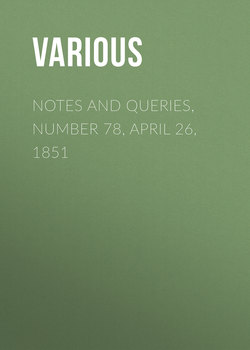Читать книгу Notes and Queries, Number 78, April 26, 1851 - Various - Страница 4
Notes
SHAKSPEARE AND FLETCHER
ОглавлениеI feel greatly obliged to your correspondent C. B. for the attention he has bestowed on the question of Fletcher's connexion with Henry VIII., as it is only through the concurrent judgments of those who think the subject worthy of their full and impartial consideration, that we can hope to arrive at the truth. His remarks (Vol. iii., p. 190.) are the more valuable, as they coincide with a doubt in my own mind, which has, to a great extent, ripened since I last communicated with you on the subject; and, indeed, I have no need to hesitate in saying, that I had more difficulty in coming to a conclusion with regard to the scene (Act III. Sc. 2.) in which the passages occur quoted by C. B., than with any other scene in the whole play. The suggestions, that Shakspeare might have touched scenes of which the mass had been written by Fletcher, is a point which I had not overlooked, and which indeed, to some extent, might be said to follow from the view I took of the relation of Shakspeare and Fletcher as master and scholar. Yet this suggestion is especially valuable regarding this scene, and may account for that which, without it, is not so easily explained.
If, however, there be any lurking notion in your correspondent's mind, that the scene in Antony and Cleopatra (Act III. Sc. 1) referred to by X. Z. (Vol. iii., p. 139.) is, judging from certain coincidences of expression, an interpolation, and not by Shakspeare, I beg at once to be allowed to express my total dissent from such a view. Whether, also, there may have been any secondary allusion to some known event of the day, as X. Z. supposes, and as is by no means improbable, I cannot say; but I protest against its being said that the scene referred to is "totally unconnected with what goes before, and what follows." Antony is the hero of the play; and this scene shows the culminating point of Antony's fortunes, when his very successes turn against him.
To return to Henry VIII., the compliment to the Queen, to which your correspondent refers, is, as he very justly observes, brought in in a very forced manner. This, to my mind, is very strong evidence; otherwise I should not think it unworthy of Shakspeare. And it still has to be borne in mind, that he would have had to accommodate his characters and circumstances to the views of another writer. Shakspeare's spirit was too catholic, too universal, to have allowed, in a work entirely his own, even his Wolsey to have made use of the term "a spleeny Lutheran;" yet neither in the passage in which this expression occurs, nor in the one above referred to, is the versification characteristic of Fletcher. For my own part, however, I cannot recognise Shakspeare's spirit in this antagonism of creeds, which is, perhaps, even more strongly displayed in the prophetic speech of Cranmer's in the last scene, wherein he says, "God shall be truly known!" It may be said, that in both these instances the expressions are true to the characters of Wolsey and Cranmer. It may be so; for both are wanting in that ideal elevation which Shakspeare never fails to give. That, with this reservation, he becomes the mouth-piece of each character, is most true; and a curious instance of the writer's utter forgetfulness of his assumed character of contemporary with the events he is relating, occurring in Act. IV. Sc. 2 where Griffiths says—
"He was most princely: ever witness for him
Those twins of learning, that he rais'd in you,
Ipswich and Oxford! one of which fell with him,
Unwilling to outlive the good that did it;
The other, though unfinish'd, yet so famous,
So excellent in art, and still so rising,"—
has no parallel in Shakspeare's works. To John Fletcher, indeed, at the close of the reign of Queen Elizabeth, these things were known; but scarcely to the attendant of Queen Katherine, who has but just narrated the circumstances, then newly happened, of Wolsey's fall. On maturer consideration, then, I am inclined to think that the whole of the scene (Act III. Sc. 2.) to which your correspondent refers, was originally written by Fletcher, although, as it now stands, it is strongly marked by the hand of Shakspeare. In the same category, also, I am inclined to place Scenes 3. and 4. of Act II. It will be observed that these changes are not inconsistent with the view I had previously taken; the effect being merely, that I am inclined to ascribe a little more than in the first instance to the hitherto unsuspected participator in the work. I am not sure, too, that I shall not be coming nearer to Mr. Spedding; as, if I am not mistaken, it is in some of these scenes that he imagines he detects "a third hand;" a theory which, though I do not adopt, I certainly have not confidence enough to reject altogether. But this view affects so very small a portion of the play, that it is of very little consequence.
Samuel Hickson.
